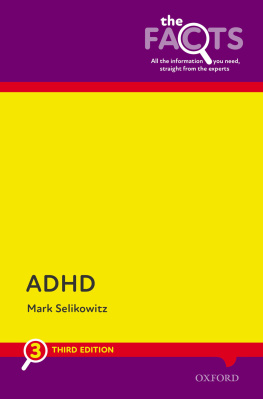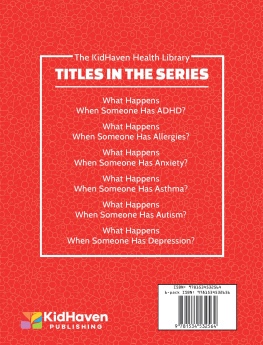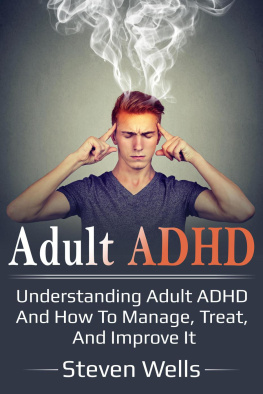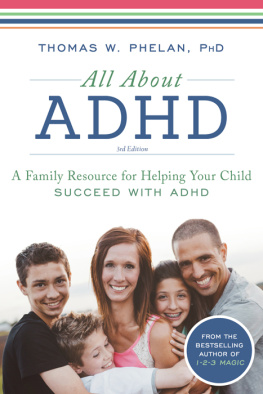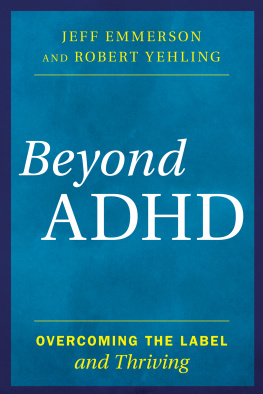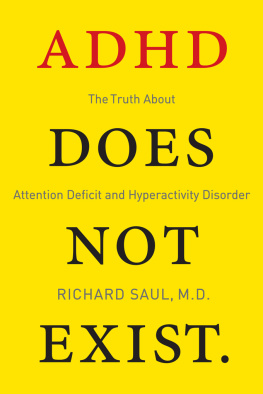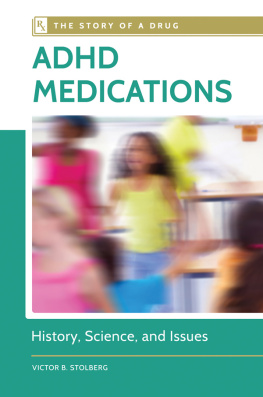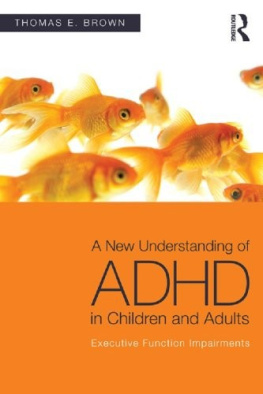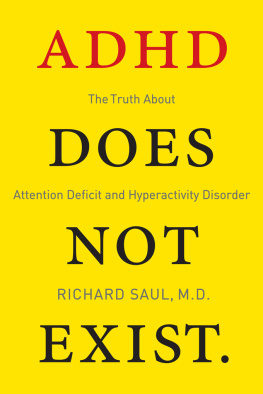This book is dedicated to myniece, who has struggled with ADHD since she was a child.
Chapter 1- What Is ADHD?
AttentionDeficit Hyperactive Disorder (ADHD) begins in the childhood years and is a truemental disorder. ADHD can affect the way children think, feel and act. Almostall children are inattentive and overactive from time to time, but for childrensuffering with ADHD and their families, their behavior is often disruptive andextreme.
ADHDaffects approximately five percent of school age children. Overall, ADHD isabout four times more common in boys. In some children, there is a period ofremission around puberty time, but for others, the condition left untreated cancontinue throughout their adult life.

Ingeneral, a child with ADHD has a hard time concentrating, is constantly moving aroundand might have a poor performance at school compared with intelligence.Oftentimes, their behavior at school or home is disruptive.
Beloware some of the symptoms of ADHD that manifests in infants
They are constantlythirsty.
They experienceextreme restlessness, sleep patterns and crying.
They are difficult tofeed.
They have frequenttantrums, rocking the bed and head banging.
Some of the ADHDsymptoms in older children are below.
They have a briefattention span and poor concentration.
They are impulsive,and do not stop to think.
They have poorcoordination.
They lack self-esteem
They are always onthe go.
They take undue risksand seem fearless.
They have a weakershort-term memory
They have sleepingand eating problems.
Notevery infant or child with ADHD will have these features, and the degrees ofseverity can vary from child to child.
Thereare three types of ADHD:
PredominatelyInattentive ADHD This type of ADHD is when a person has a very hard timeorganizing and finishing up a task. They have a hard time followinginstructions and listening to conversations. They find it too hard to payattention to all the details of a task.
PredominantlyHyperactive-Impulsive Type With this type of ADHD, a person has a hard timekeeping still. They are constantly talking and fidgeting around. Smallerchildren will jump, run and climb continually. They are impulsive and restless constantly interrupting others, talking when it is inappropriate and grabbingthings. They cannot wait for their turn, and they have more accidents andinjuries than others do.
CombinedType A person who has symptoms of both is considered to have the combinedtype of ADHD.
Itis pretty well accepted that a child with ADHD lacks the ability to focus theirattention on one thing at a time, that they are impulsive and that oftentimes,they cannot control motor access. These deficits can create a dysfunctionalperformance at school, at home and socially.
Childrenwith ADHD might require more monitoring from teachers and parents due to thelack of internal neurological control. This will better help them adapt totheir inefficiencies.
WhenADHD is diagnosed early in a childs life, it is easier to begin developing aneffective system of monitoring strategies which help prevent any furthercomplications. When a child is not diagnosed accurately or in the early stages,there is a pretty good chance that teachers and parents both will experiencesome frustration and possibly even become angry with the child. Equally, thechild may experience feelings of frustration and anger as well as developinglow self-esteem.
Thereis not a formal test to diagnose ADHD, so information such as evaluations,observations and information from the parents, teachers, mental healthprofessionals and physicians are used. Listed below is some of the informationused to make a diagnosis of the condition.
ParentInterview A parent interview gives specific information about pregnancy andbirth of the child. Giving the doctor descriptions of the childs temperamentcan reveal certain characteristics of problematic social behavior and poorneurological structure. The medical history of the child and parents as well asother family members might rule out another condition or unmask somethingassociated with ADHD. Having a long discussion with the family offers a betterunderstanding of the dynamics going on inside the childs home.
TeacherInterview Information the school provides might give a clean perspective ofthe way the child is functioning, where a parent might be more emotionallyinfluenced when making their observations. The school setting offers a goodgauge to judge the character of the child. The evaluator will talk to theteacher about how the child deals with daily work demands and routine comparedto other children. When the evaluation is complete, it might be determined thatthe child has a disability learning which displays some of the samecharacteristics of ADHD.
PhysicianEvaluation An evaluation by a physician is needed to understand behavioraland developmental issues in children. Because ADHD is neurological, a completeassessment of the childs neurological system is necessary. Clinicalevaluations might identify some inadequacies or dysfunctions that influence thechilds performance. Having a combination of findings from the parent, schooland physician will allow a diagnosis of ADHD versus other possible conditions.
Parentsshould assist their ADHD child with understanding the strengths and weaknesseshe has. Part of the childs treatment might include teaching and parentingchanges to assist the child with their weaknesses.
Medicationis another avenue of treatment used for ADHD. The limitations, expectations andside effects of all medications for treating ADHD should be evaluated. The understandingwhen using medication for ADHD is that the medicine is not a cure for ADHD all is vital.
Theparents and teachers of an ADHD child need to send a message to the child thattheir difficulties are understood and that they are both willing to provideassistance and support for the ADHD. They should also let the ADHD child knowthat a commitment is expected from him or her as well. Cooperation,communication and compromise will help everyone reach this goal.
Chapter 2- Does ADHD ImpactRelationships
Asthe years have progressed, you have learned a lot more about ADHD and theimpact that it can have on the person who is dealing with it. However, youmight not know as much about how ADHD can actually impact relationships. Theshort answer is yes, it can impact all different types of relationships. Howexactly does this happen?


